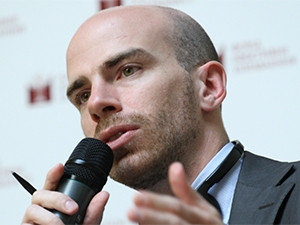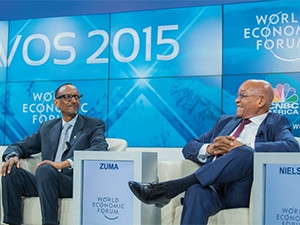
In 1994, South Africa and Rwanda experienced state-changing events that would forever alter their respective courses of history. After the unbanning of the ANC and the release of Nelson Mandela, South Africa's first democratic, non-racial election took place on 27 April 1994. That same day, Rwanda would be 21 days into 100 days of slaughter - a genocide that would leave around a million people dead.
Looking at what was happening in both countries 21 years ago, it would be impossible to predict the future trajectories of both states. How could the world's darling, the 'Rainbow Nation', do anything other than shine? How could Rwanda ever crawl back from that terrible river of blood?
Fast-forward two decades and the land-locked, agrarian economy of Rwanda is the West's favourite good news story, thanks, in part, to the technology loving Paul Kagame. Politico magazine calls him 'The Darling Tyrant', while Bill Clinton declares Kagame to be among 'the greatest leaders of our time'.
The reason for this is Rwanda's ICT policy, which has been successfully actioned, and is changing people's lives. A case in point is local land registrations, which were a protracted and painful process, but which can now be done online.
The will to remake Rwanda using technology comes directly from the authoritarian Paul Kagame. When Kagame became president of Rwanda in 2000, he helped forge a road map for a technology-inspired transformation called Vision 2020, which rests on six interlinked pillars: governance, an efficient state, well-developed human capital, solid physical infrastructure, robust private enterprise and modernised agriculture.
A tale of two countries
But the big push is technology. Kagame actively drives the development of ICT skills, technology education, public private technology partnerships, a robust technology-rich physical infrastructure, and he personally promotes investment in the ICT sector.
"Rwanda is an excellent example of leadership from the top," says Lise Hagen, research manager for software and IT services at IDC South Africa. "The president goes canvassing Silicon Valley investment in person. Obviously Rwanda needs a lot of PR - they've had a very chequered past - but he really punts Rwanda as a destination for IT investment," she says.
"The government of Rwanda took the decision that if it was to attract foreign investment, or attract business visitors, it had to have a connected economy," says Adrian Schofi eld, director and VP of the Institute of Information Technology Professionals South Africa. He says Rwanda's plan looks like this: "Get yourself hooked in to the global fi bre network and connect as many people as you can internally. Once that's done, you enable people to build economic activity on the basis of instant communication. It's a no-brainer. In 2015, one shouldn't even be debating the how, when, why. You should just get on with it."
Rwanda isn't the IT powerhouse of Africa by any means, but it does go to show what can be done if leadership and ownership is taken from the very top.
Lise Hagen, IDC
Rwanda has developed steadily during the past decade, achieving an annual growth of around seven or eight percent - well above the Sub-Saharan average. Inflation is moderate, the economy is stable, and the percentage of the population living in poverty has dropped markedly.
SA's gloomy outlook
By contrast, 21 years into democracy, South Africa is flailing. The Economist summed up this country's prospects in one Twitter-worthy sentence: 'Africa's second-largest economy is in a huge mess.' This May 2015 story began: 'There is little in the way of bright news about South Africa's economy - and not just because power cuts are plunging neighbourhoods into darkness several times a week. According to figures released on May 26, annual GDP grew by a mere 1.3 percent in the first three months of this year, a crawl compared with the 4.1 percent achieved in the fourth quarter of 2014."
Unlike Kagame, Zuma is no ICT lover. At best, Zuma's relationship with technology can be described as estranged, evidenced by the president's State Of The Nation addresses that keep technology at arm's length. They have contained only the most cursory, and obligatory, mentions of ICT. But the president's cruellest blow came in May 2014, when he rent the department that directs ICT in SA into two, enhancing the chaos that is this country's (non) ICT policy.
All the South African government seems to be doing when it comes to ICT 'policy' is talk.
"Strictly speaking, right now, we don't have a policy because the national integrated ICT policy discussions have yet to produce any sort of white paper that can be turned into a formally adopted policy document," says Schofield, "and that is in spite of visiting this particular task various times over the last 20 years.
"There is no political will to finish the task and implement it. By 'finish the task', I mean put the policy on paper and then follow it. We talk loud and long about what we are going to do," he says. But it's just that - talk.
The Zuma era put a revolving door on parliament, with frequent changes in ministers. "Each succeeding minister has more or less started again and then not produced the goods," Schofield laments. "There doesn't seem to be any ongoing commitment to whatever work was done in the department by succeeding ministers."
The bottom line is that South Africa's policy is failing to drive progress because local politics is all about patronage and entrenching power.
New ministers mean new consultations, indabas and dialogue - or Control-Alt-Delete and policy continuity is disrupted.
In the past 21 years, the country has had nine Ministers of Communication, before Zuma split off the telecommunications and postal services under a newly created government department - Telecommunications and Postal Services - and brought Cwele from safety and security to run it.
In his book, The Zuma Years, political analyst Richard Calland calls Cwele a 'Zuma- loyalist securocrat'. A medical doctor with a Master's degree in economic policy, Cwele championed Zuma's Protection of State Information Bill and pushed for the disbanding of the Scorpions, but is best remembered - because of the sensational media headlines - for his wife's drug-trafficking problems.
ICT's Captain Chaos
In his new incarnation, Cwele is drowning in a sea of chaos. There's been a ping-pong and finger-pointing on digital migration with fellow Zuma loyalist Faith Muthambi, who heads the Communications department. That was supposed to have been resolved in 2011.
It's unlikely that the latest deadline set by the government and the International Telecommunication Union will be smooth sailing. This has been particularly harmful to smaller telecommunications players and a mass market hungry for accessible, affordable broadband.
The rollout of broadband has also largely stalled, and senior officials are departing Cwele's ministry in droves. His department is not even a year old, but is beset by disciplinary hearings, Special Investigation Unit probes, tender scandals, stalled policy and mismanagement.
Tech growth gap
Things look bleak when looking at South Africa's dismal performance in the global ICT rankings: South Africa ranks at 75 in the Networked Readiness Index from the World Economic Forum's Global Information Technology Report 2015. Singapore takes the top spot, and replaces Finland (2), which had held the leading position since 2013. Other top ten countries include Japan (10), Sweden (3) and the US (7), which has the highest-placed G7 economy. The Netherlands (4), Norway (5) and Switzerland (6) precede the UK (8), while Luxembourg (9) - the country - beats the world's fourth-largest economy, Germany (13).

The Networked Readiness Index measured the capacity of 143 economies to prepare for and leverage ICTs, and the data from this survey suggests that the gap between best and worst performing economies is widening. "Those in the top ten percent have seen twice the level of improvement since 2012 as those in the bottom ten percent," the report states.
Thierry Geiger, an economist with the World Economic Forum, says the best performers in the index typically have excellent ICT policies, but also offer an excellent business environment and investment climate, with favourable FDI rules and top-notch digital infrastructure. He says the population of these countries is also highly skilled.
"All these factors provide a fertile ground for ICT development. As a result, these countries boast very high levels of ICT uptake. As more people use ICT, there is more investment and more innovation, demand for applications increases, more content is produced, employment in high value added sectors increases, too. And slowly - it certainly does not happen overnight - the economies of these countries become more digital, more innovation-driven," Geiger says, which explains why the leaders start to pull away from the pack.
A problem of political will
What's the problem with South Africa? "It's highly politicised," says Hagen. "Politicking gets in the way of rolling up one's sleeves and getting things done. The other issue is a lack of leadership."
The bottom line is that South Africa's policy is failing to drive progress because local politics is all about patronage and entrenching power rather than serving the people and growing the economy. Until this changes, South Africa will continue to be a case study of policy paralysis, rather than a success story like Rwanda, where ICT policy promotes progress.
This article was first published in Brainstorm magazine. Click here to read the complete article at the Brainstorm website.
Share